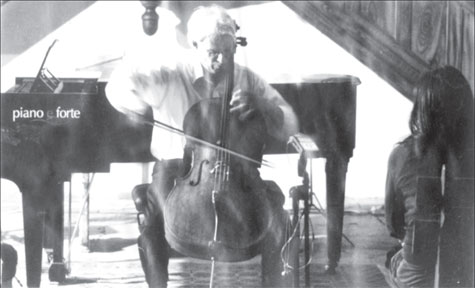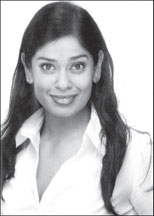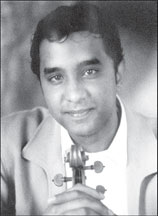Flying the flag
ROSL prizewinning musicians tell us how their Sri Lankan heritage has
shaped their careers and why their links to their home counrty are so
important to them.
|

Rohan de Saram |
Kishani Jayasinghe, Soprano
Question: You come from a musical family. How did that
influence your growing up?
Answer: I grew up in Colombo and was fortunate enough to be
exposed to many types of music, ranging from traditional Sri Lankan to
Western classical. My father and his three siblings formed their own
string quartet and my grandmother was a pioneer member of the symphony
orchestra. My mother's family excelled in piano and had an ongoing love
affair with the voice.
I have strong memories of favourite Puccini, Verdi and Tchaikovsky
arias playing in the background whenever I visited my maternal
grandparents, and lots of Mozart and Strauss when I was with my paternal
grandparents. These continue to be my favourite operatic composers.
One of my earliest memories is hearing Maria Callas's rendition of
Vissi d'arte. I remember thinking that this kind of unadulterated vocal
prowess was extraordinary, so perhaps early exposure to this type of
music influenced my life. On a tiny island, such as Sri Lanka, it was
certainly unusual to grow up immersed in the world of classical music.
While our friends spent the evening at the cinema, my brother and I
would attend an orchestral concert.
Aptitude
Q: When did your musical education begin?
A: I always loved to sing and a wonderful teacher in Sri Lanka
recognised that I had a natural aptitude. However, growing up in Asia, I
never considered becoming a professional artiste. I went to England and
had just completed a Master's in Law when destiny placed (renowned vocal
coach) Pamela Cook in my path. It was her unreserved belief in me, and
the unconditional support of my parents and family, that gave me the
confidence and strength to make the switch over from law to singing. I
was offered a scholarship to study at the Royal Academy of Music, and
was then accepted on the Jette Parker Young Artistes Program at the
Royal Opera House (ROH). Pam continues to be my teacher and most
cherished mentor.
 |
 |
| Kishani
Jayasinghe |
Ashan Pillai |
Q: Tell me about representing Sri Lanka at the ROSL centenary
celebrations....
A: I was delighted; being introduced to the Queen as a pioneer
in this art form in my country was one of the most memorable moments of
my career. It felt as if I had come full circle, as I had previously
represented Sri Lanka as the recipient of the ROSL/Sri Lanka
scholarship, and first met (Director of Arts) Roderick Lakin as a
teenager.
Responsibility
I feel a great responsibility when I am flying the flag, so to speak.
I am fortunate to have had that privilege several times. It was such an
unusual career path for a girl born and raised in Sri Lanka, and to be
given that level of recognition for doing something I love is a dream
come true.
Q: Is it true that you were also the first Sri Lankan to
perform on the main stage at the ROH?
A: Absolutely. I was incredibly excited about making it there,
not only as the first Sri Lankan, but also as the first South Asian
soprano. I was so happy to have the opportunity to open that door for
future singers from my region.
Ashan Pillai, viola
Q: You have studied in Britain, the United States and Canada.
When did you decide to move overseas?
A: I was born in Colombo, but my parents migrated to the UK
when I was nine months old. I started playing the violin at the age of
seven while I was at school in England. We then returned to Sri Lanka
for two years, and later switched to viola, aged 11. I have received
great teaching throughout my education, firstly at the Royal Academy of
Music in London, then at the University of Southern California in Los
Angeles, Banff in Canada and the Juilliard School in New York.
Q: When did your relationship with ROSL begin?
A: In 1995 with my participation in the Annual Music
Competition; I won the Bernard Shaw Memorial Scholarship for a viola
player.
Mysical ties
Q: Why is it important for you to retain musical ties with Sri
Lanka?
A: I first went back to Sri Lanka to play for the 50th
anniversary of independence in 1998, after an absence of 15 years. I
played as a soloist with the English Chamber Orchestra in the presence
of Prince Charles. Since then I have been here every two years to play
recitals, chamber concerts, and do educational work and master-classes.
It has become an important part of my life - the opportunity to show
that there are Sri Lankans representing all artistic fronts on an
international level, especially for the younger generations. I also get
the chance to see my family there and enjoy the wonderful local cuisine.
I have to thank the British Council for their support in each of my
trips to Sri Lanka.
Q: How has your Sri Lankan heritage influenced your musical
career?
A: That's a difficult question. My visits to India and Sri
Lanka are a result of this heritage, but music is an international
language which surpasses boundaries of language, race and sex, and,
therefore, there has been little that I consider influential when
looking at my heritage - except possibly character traits and a relaxed
attitude to everything.
Polish cellist
Q: When did you start to study music?
A: My father was a lawyer, but both my parents were keen
amateur musicians. As children, my brothers, sister and I learned to
play the piano; I also studied the Kandyan drum, one of the main
classical instruments of Sri Lanka.
It was difficult to find good teachers for Western instruments, so
when my parents heard that a fine Polish cellist, Martin Hohermann, had
arrived they asked if he would teach one of the children. He was not
interested, but after he heard me play the piano he agreed to teach me,
on the condition that I made sufficient progress.
After a year, Hohermann became very insistent that my parents send me
to Europe to continue my training. This was certainly not something my
parents had in mind for my future, but I set off with my mother by boat,
at the age of 11, to play to some of the leading cellists of the time,
in London, Paris and Prades. Gaspar Cassado offered to teach me, free of
charge, in Florence, Italy.
Q: How did you get involved in the ROSL Annual Music
competition?
A: Studying went hand in hand with concert playing in many
countries. The ROSL competition, which I won in 1955, was among the
earliest of these competitions and, from what I remember, had just one
round and one adjudicator: the composer Herbert Howells. Winning the
competition helped me a lot during that stage of my career.
Sacred music
Q: What are the sounds you most associate with Sri Lanka?
A: The wide variety of drums, the piercing sound of the
double-reed horanewa, Buddhist chanting, and the awe-inspiring sacred
music of the nagasvaram in the Hindu temples are all very vivid in my
mind and something from which I draw inspiration in my improvisations.
In the Cello Sequenza XIV that Luciano Berio wrote for me, he
incorporated the rhythms of the Kandyan drum of Sri Lanka.
Q: How important is it for you to collaborate with Sri Lankan
musicians?
A: I have worked for many years with my pianist brother Druvi
in programs of mainly, but not exclusively, Western music. I have also
had the good fortune to work with some of the leading Kandyan drummers
and dancers from Sri Lanka, among them the drummer Piyasara Silpadipathi
and dancers Chitrasena and Vipuli.
Since the combined tragedies of terrorism and the tsunami in Sri
Lanka, I have participated in fund-raising concerts with colleagues from
Sri Lanka and other parts of the world.
Courtesy: Overseas |


